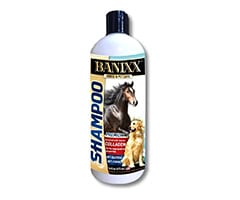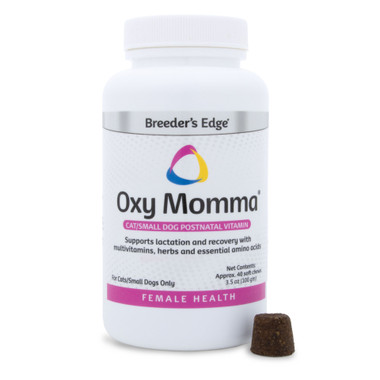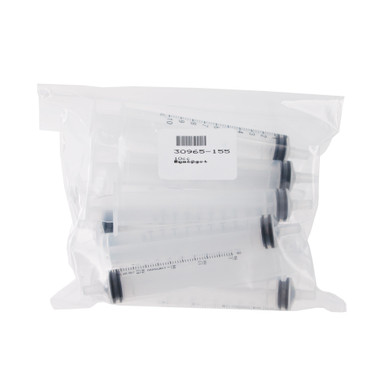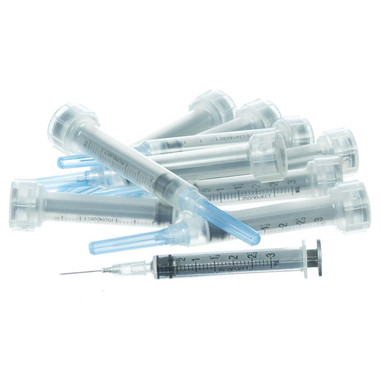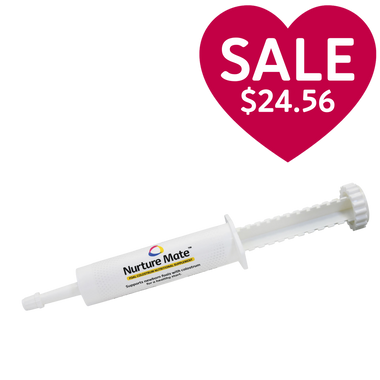What to Do About Dogs Chewing Their Paws
Estimated 0 min read
If you’ve noticed your dog excessively licking or chewing their paws, you’re not alone. This common behavior can stem from a variety of causes, ranging from allergies and skin conditions to psychological factors. As a pet owner, understanding why your dog is chewing their feet is the first step in providing effective relief. In this short blog, we’ll explore the reasons behind this behavior, how to identify the underlying causes, and the various treatment options available to help your furry friend find comfort.
Facts About Dogs Chewing Their Paws
- Excessive paw chewing in dogs can be caused by allergies, skin conditions, injuries, parasites, or psychological factors such as anxiety or boredom
- Proper diagnosis is crucial for effective treatment, often requiring a combination of at-home observation and professional veterinary examination
- Treatment options vary based on the underlying cause and may include medications, dietary changes, environmental modifications, and behavioral interventions
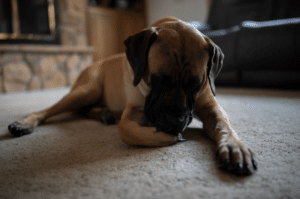
Dog chewing on paws
Difference Between Normal and Excessive Paw Chewing in Dogs
Normal paw licking typically involves short, occasional sessions lasting a few minutes at a time. You might observe your dog giving their paws a quick once-over after coming in from outside or as part of their regulargrooming routine. This behavior is characterized by a relaxed demeanor and doesn’t interfere with your dog’s daily activities or cause any visible distress.
Excessive paw chewing, on the other hand, is a different story altogether. When paw licking and chewing become obsessive or persist for extended periods, it’s a clear indication that something is amiss. Dogs suffering from this issue may spend inordinate amounts of time focused on their paws, returning to lick and chew repeatedly throughout the day. The intensity of their actions often takes on a frenzied or manic quality, distinctly different from the calm nature of normal grooming.
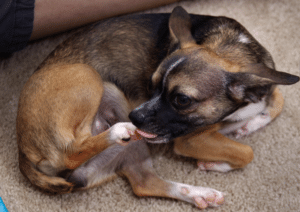
Dog with irritated paw
Visible signs of excessive paw chewing
One key indicator of excessive paw chewing is the development of visible signs of irritation or injury. You may notice redness, swelling, or hair loss on the affected paw or paws. In severe cases, persistent chewing can lead to the formation of hot spots – raw, red, and inflamed areas of skin that can quickly become infected. Another telltale sign of problematic paw chewing is if you notice your dog limping, showing signs of discomfort when walking, or being reluctant to have their paws touched.
It’s important to note that while all dogs may occasionally engage in paw licking and chewing, certain factors can predispose some dogs to develop problematic behaviors. Dogs with allergies, for instance, may be more prone to excessive paw chewing due to the itching and irritation caused by their allergic reactions. Similarly, dogs with thicker coats may be more susceptible to developing hot spots due to moisture trapped close to the skin, especially if they frequently swim or spend time in wet environments. If you notice a sudden increase in paw chewing or if the behavior becomes persistent and intense, it’s time to investigate further.
Reasons Why Dogs Chew Their paw
Allergies
Allergiesfrequently top the list of reasons why dogs chew their paw. When a dog’s immune system overreacts to certain substances, it can trigger intense itching, particularly in the paws. This discomfort often manifests as excessive licking and chewing as the dog attempts to alleviate the irritation.
Environmental allergies, also known as atopic dermatitis, occur when dogs react to substances in their surroundings such as pollen, mold, or dust mites. These allergens come into direct contact with the paws as dogs walk, triggering localized reactions. The science behind this involves the dog’s immune system releasing histamines and other inflammatory substances upon exposure to the allergen. This release occurs when IgE antibodies on mast cells recognize the allergen, leading to the characteristic itching and inflammation.
Rosie’s Story
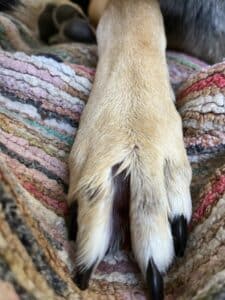
Rosie’s paw due to excessive chewing
In the picture shown here of Rosie’s paw, her licking had become quiteincessant.Her owner doused her paw withBanixx Pet Care. Surprisingly, this took complete care of the problem. The next day, she was licking incessantly again, now, we noticed, that the hair was gone. Again, we doused withBanixx Pet Care. Subsequent day, problem gone and never returned. We are guessing she picked up some outside allergen but for us, this was an inexpensive, quick fix!
Food allergies represent another significant category that can lead to paw chewing. Unlike environmental allergies, food allergies stem from an adverse reaction to specific ingredients in a dog’s diet, often proteins like chicken or beef. When a dog with food allergies consumes the problematic ingredient, their immune system identifies it as a threat and mounts an allergic response. This can result in a systemic reaction, causing widespread itching that dogs often notice most acutely in their paws.
Flea allergy dermatitis, while often overlooked, can be a significant trigger for paw chewing. This condition occurs when a dog develops an allergic reaction to flea saliva. Even a single flea bite can trigger an intense response in sensitive dogs. The science behind flea allergies involves a hypersensitivity reaction where the dog’s immune system produces an exaggerated response to the flea saliva antigens. This leads to the release of inflammatory mediators, resulting in persistent itching that can last long after the flea is gone.
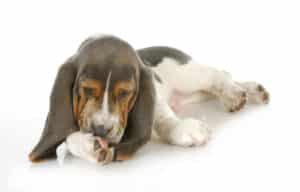
Dog with skin condition
Skin Conditions
While allergies are a common culprit, various skin conditions can also drive dogs to chew their paw. These dermatological issues can cause significant discomfort, leading to persistent licking and chewing as dogs attempt to alleviate their symptoms.
Dry skin in dogs occurs when the skin loses its natural moisture and protective oils. The stratum corneum, the outermost layer of the skin, normally acts as a barrier to retain moisture and protect against irritants. When this barrier is compromised, it can lead to microscopic cracks in the skin, increased sensitivity, and a cycle of itching and inflammation. As a result, dogs may chew their paws in an attempt to relieve the itching and discomfort.
Pododermatitis, often referred to as “pillow foot,” is a condition characterized by inflammation of the paws, including the nail beds, paw pads, and interdigital spaces. This condition can have various causes, including bacterial or fungal infections, allergies, or autoimmune disorders. This is due to an inflammatory response in the skin of the paws, leading to redness, swelling, and often the formation of pustules or vesicles. The discomfort caused by pododermatitis can be intense, driving dogs to excessively lick and chew their paws.
Hot spots, medically known as acute moist dermatitis, are localized areas of intense inflammation and bacterial infection in the skin. These lesions can develop rapidly, often starting from a small irritation that the dog’s persistent licking and chewing exacerbates. The scientific mechanism behind hot spots involves a cycle of irritation, moisture, and bacterial overgrowth. When a dog licks or chews an area excessively, it creates a moist environment ideal for bacterial proliferation. This bacterial growth further irritates the skin, leading to more licking and chewing, thus perpetuating the cycle.
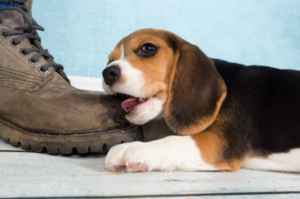
Dog chewing …. is he bored or anxious?
Psychological Factors
When a dog experiences anxiety, their body releases stress hormones like cortisol and adrenaline. These hormones create a state of heightened arousal, leading to behaviors aimed at self-soothing or tension relief. Paw chewing often serves as a coping mechanism, providing a focus for the dog’s nervous energy. The repetitive nature of the behavior can have a temporary calming effect, potentially reinforcing the behavior.
Boredom, while seemingly less severe than anxiety, can be a significant driver of paw chewing behavior. Dogs who are bored may resort to repetitive behaviors like paw chewing as a form of self-entertainment. From a neurological perspective, engaging in such behaviors can stimulate the release of dopamine, a neurotransmitter associated with pleasure and reward. This creates a feedback loop where the dog finds the act of chewing rewarding, encouraging them to repeat the behavior.
Stress in dogs can arise from various factors, including changes in routine, conflict within their household, or exposure to frightening stimuli. Like anxiety, stress triggers the release of cortisol, which puts the body in a state of heightened alertness. This physiological state can manifest in behaviors like paw chewing as the dog attempts to cope with their discomfort. Stress-related paw chewing may be more intense or frequent during or immediately after stressful events.
Obsessive-Compulsive Disorder (OCD) in dogs, while less common than the previous factors, can be a severe cause of paw chewing. Canine OCD is characterized by repetitive, exaggerated behaviors that interfere with normal functioning. In the case of paw chewing, what might start as a normal grooming behavior can escalate into a compulsive action that the dog feels compelled to perform. The exact mechanisms of OCD in dogs are not fully understood, but it’s believed to involve imbalances in neurotransmitters, particularly serotonin.
When to Be Concerned About Dog Chewing Their Paw
While occasional paw licking is normal canine behavior, excessive chewing warrants closer examination. As a pet owner, you play a vital role in the initial assessment, but professional veterinary expertise is often necessary for a definitive diagnosis.
Your first step in diagnosing the issue should be a thorough at-home examination of your dog’s paws. Look closely at the pads, between the toes, and around the nails. Check for any visible signs of injury such as cuts, punctures, or foreign objects like thorns or small stones. Redness, swelling, or unusual warmth in the paw area can indicate inflammation or infection. Pay attention to any strong odors, which might suggest a yeast or bacterial infection. If your dog has long fur, carefully part the hair between the toes to inspect the skin underneath.
While examining your dog’s paws, take note of any patterns in their chewing behavior. Does it focus on one particular paw or all four? Is the chewing more frequent after walks or during certain times of the day? These observations can provide valuable clues for diagnosis. For instance, if the chewing intensifies after outdoor activities, it might point towards environmental allergies or contact with an irritant.
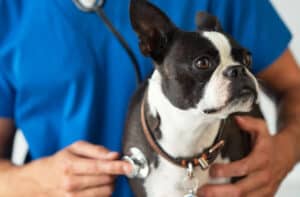
Vet checking dog’s vitals
When to See a Vet About Your Dog Chewing Their Paw
Even if your dog’s paw chewing doesn’t seem severe, it’s wise to seek veterinary advice if the behavior persists for more than a few days or if it’s interfering with your dog’s daily activities. Chronic paw chewing can lead to secondary issues such as bacterial infections or the development of persistent behavioral patterns that become harder to address over time.
Remember, while you can gather valuable information through at-home observation, a veterinary professional has the expertise and diagnostic tools necessary to identify the root cause of your dog’s paw chewing. They can differentiate between similar-looking conditions and develop a targeted treatment plan to address the specific issue affecting your pet. By combining your observations with professional veterinary care, you can effectively diagnose and address your dog’s paw chewing, ensuring their comfort and well-being.
When you visit the veterinarian, they will likely begin with a comprehensive physical examination. This may include palpating the paws to check for pain or swelling, examining the skin and coat condition, and potentially taking samples for further testing. The vet might perform skin scrapings to check for mites or conduct allergy tests to identify specific triggers. In some cases, blood tests may be necessary to rule out systemic health issues that could be contributing to the paw chewing behavior.
For persistent or severe cases, your veterinarian might recommend more advanced diagnostic techniques. These could include skin biopsies to identify specific dermatological conditions or x-rays to check for orthopedic issues that might be causing discomfort. In cases where psychological factors are suspected, your vet might suggest a behavioral assessment or referral to a veterinary behaviorist.
Once the underlying cause of your dog’s paw chewing has been identified, the next step is to explore appropriate treatment options.
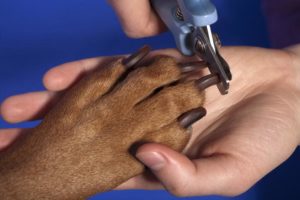
Dog being groomed
Treatment Options for Dogs Chewing Their Paws
For dogs with allergies, treatment typically focuses on managing the allergic response and reducing inflammation.Antihistaminescan be effective in controlling environmental allergies, while corticosteroids may be prescribed for more severe cases to quickly reduce inflammation and itching. In cases of food allergies, an elimination diet is often recommended. Immunotherapy, in the form of allergy shots or oral drops, can be beneficial for long-term management of environmental allergies.
When skin conditions are the root cause of paw chewing, treatment often involves topical or systemic medications. For dry skin, the application of moisturizing balms or oils can help restore the skin’s natural barrier function. Medicated shampoos containing ingredients like chlorhexidine or miconazole may be prescribed to address bacterial or fungal infections. In cases of pododermatitis, a combination of antibiotics, antifungals, and anti-inflammatory drugs might be necessary to resolve the condition. For hot spots, treatment typically involves clipping the hair around the affected area, cleaning the wound, and applying topical medications to promote healing and prevent infection.
Parasitic infestations require targeted treatments. Flea allergy dermatitis is managed through aggressive flea control measures, including regular application of veterinarian-approved flea preventatives and thorough cleaning of the dog’s environment to eliminate flea eggs and larvae. For mange caused by mites, oral or topical medications such as ivermectin or selamectin are often prescribed to eradicate the parasites.
For dogs whose paw chewing is driven by psychological factors such as anxiety or boredom, treatment often involves a combination of behavioral modification and environmental enrichment. This might include increased exercise, interactive toys to provide mental stimulation, and techniques to manage separation anxiety. In some cases, anti-anxiety medications or supplements may be prescribed to help manage severe stress or compulsive behaviors.
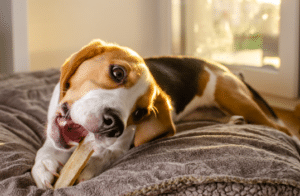 Listen to your vet
Listen to your vet
It’s crucial to follow veterinary advice closely when implementing any treatment plan. This includes administering medications as prescribed, attending follow-up appointments to monitor progress, and reporting any changes or new symptoms promptly. Remember that each dog is unique, and what works for one may not work for another. Patience and consistency are key when implementing any treatment or preventive measures.
At Banixx, we’re committed to providing you with the knowledge and resources you need to keep your dog healthy from nose to tail. We encourage you to explore our other articles and products designed to support your pet’s well-being. For example, read our related article aboutusing Benadryl for dog allergies.Or maybe a fun readwhy your dog LOVES cuddling with you. With the right care and attention, you can help ensure your dog’s paws stay healthy, allowing them to focus on what they do best – being your loyal companion!
Sources
https://bettervet.com/resources/pet-health-care/dog-chewing-paws
https://www.petmd.com/dog/general-health/why-do-dogs-lick-chew-paws
https://www.airvet.com/blog/why-dogs-chew-their-paws
https://www.akc.org/expert-advice/health/why-does-my-dog-lick-chew-paws/
https://www.earthrated.com/blogs/blog/dog-chewing-paws/
https://www.dogster.com/dog-health-care/why-do-dogs-chew-their-paws



